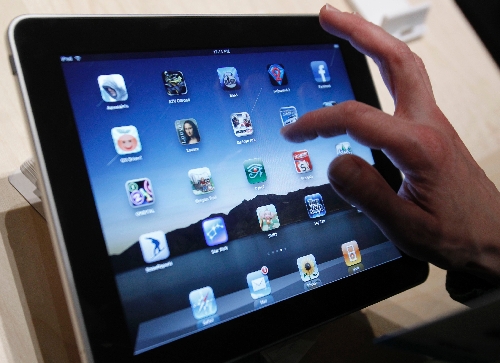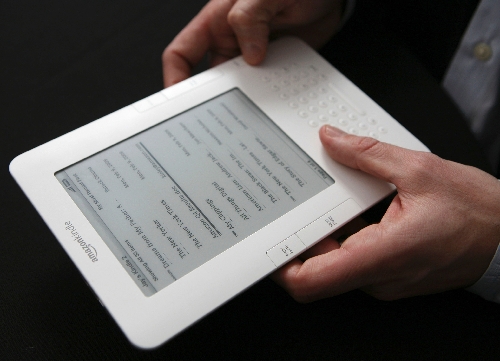KINDLE VS. IPAD
SAN FRANCISCO -- Amazon.com, which has dominated the young but fast-growing electronic book market for the past few years with the Kindle, could get its biggest threat Saturday, when Apple releases its iPad multimedia tablet.
The Kindle starts at $259 and is designed mainly for reading text on a gray-and-black screen. The iPad starts at $499, but with the higher price comes more functions: a color touch screen for downloading books from Apple's new iBookstore, surfing the Web, playing videos and games and more.
It will take time to determine whether the iPad causes a tremor in the e-reader market, a high-magnitude quake or something in between. In the meantime people who read electronic books or are considering buying a reading device will find their choices getting more complicated.
If the Kindle e-reader falls out of favor with people drawn to Apple's offering, there could be a very thick silver lining for Amazon: It sells e-books that can be read on many kinds of devices, including the iPad and other Apple gadgets. That means the Kindle could fade and Amazon could still occupy a profitable perch in e-books.
However, Apple could find ways to tilt the field in its favor. At least for now, both the Apple iBookstore and the Kindle service will be accessible in much the same way on the iPad -- as "application" icons that users can click. Apple could eventually give its own bookstore and reading program more attention on the iPad.
Apple also could try to curry favor with publishers in a way that matters to consumers, perhaps by securing exclusive titles.
Publishers' relationships with Amazon have been strained by Amazon's insistence on charging $9.99 for some popular e-books. Publishers have complained that it is an attempt to get consumers used to unsustainably low prices. Amazon takes a loss on some books at that price, and the publishers fear that if the $9.99 tag sticks, Amazon will force publishers to lower their wholesale prices, cutting into their profits.
The iPad gives publishers an opportunity for a new pricing model. Some e-books will cost up to $14.99 initially, and Apple is insisting that publishers can't sell books at a lower price through a competitor. The iBookstore is launching with titles from major publishers such as Penguin, Simon & Schuster, HarperCollins, Hachette Book Group and Macmillan. One big publisher, Random House, has not struck a deal with Apple.
Although Amazon has tried to snag as much of the e-book market as possible since launching the Kindle in 2007, the company has never revealed how many Kindles it has sold. Analysts estimate it has sold 3 million. (Analysts believe Apple could sell that many iPads in the product's first year). Amazon has offered only sketches of the Kindle's effect on its business, such as by saying that when books are sold in both hard copy and the Kindle format, it sells 48 Kindle books for every 100 hard copies.
Compared with the Kindle, the iPad would seem to have some disadvantages. The entry-level model is nearly twice the price of the Kindle, yet it can't download books everywhere. It can do that only where it is connected to the Internet over Wi-Fi. At 1½ pounds, it is more than twice as heavy as a Kindle. And its battery lasts for just 10 hours, compared with up to a week on a Kindle when it has its wireless access on.
However, among the elements in the iPad's favor is a touch screen that is 9.7 inches diagonally, compared with 6 inches on the Kindle. Ron Skinner, 70, who lives in Las Vegas and bought a Kindle last February, says he has ordered Apple's product because he thinks it will offer a better reading experience.
Skinner, an Apple investor who reads about three books a week, says the contrast between the text and the background is too low on the Kindle's "e-ink" screen, and reading on it bothers his eyes. The difference between the Kindle screen and the iPad screen "is like daylight and dark," Skinner says.
People might not want it as an alternative to the Kindle and a laptop, says James McQuivey, a Forrester analyst. He says they might see the iPad as a big iPod, leaving room for other kinds of devices. And the hype surrounding the iPad may help Kindle sales with consumers who want something less expensive.
"The iPad will bring all kinds of consumer benefits that the Kindle can't even pretend to attempt," McQuivey says, "but at the same time the Kindle solves a very focused consumer need in a way the iPad can't do well."
If you're choosing between a Kindle or an iPad for reading electronic books, you might keep in mind some advantages of both products.
Kindle:
• Lower price. ($259)
• Light weight. (10.2 ounces. The iPad is 1.5 pounds.)
• Can wirelessly download books any time, anywhere from Amazon's Kindle Store without a monthly fee. The $499, entry-level iPad goes online only in Wi-Fi hot spots. Wireless connectivity anywhere requires an iPad that is $629 and up, plus a monthly service fee.
• Gray-scale "e-ink" screen that can be read in direct sunlight.
• Battery lasts up to a week with wireless connection on, or two weeks with it off.
iPad:
• LCD color touch screen is 9.7 inches diagonally, compared with 6 inches on the Kindle. That can give a more complete Web-surfing experience.
• It also functions as an iPod and video player.
• It can download music and videos from Apple's iTunes Store and games and applications from its App Store -- including e-reading apps from Apple and other companies, such as Amazon.


















